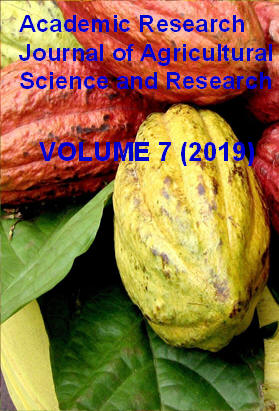|
ISSN: 2360-7874 |
Academic Research Journal of
Agricultural Science and Research |
|||||||||||||||||||
|
Vol. 7(5), pp. 238-249, July 2019 Research Effect of Some Botanicals and Trichoderma Harzianum against Root-Knot Nematode Meloidogyne Incognita, Infecting Tomato under Green House
Belay Feyisa1, Alemu Lencho2, Thangavel Selvaraj2, and Gezehegne Getaneh3
1Department of Nematology, Ambo Agricultural Research Center, P. O. Box 27, Ethiopia.
Email address: belay22feyisa@gmail.com 3Department of Nematology, Ambo Agricultural Research Center, P. O. Box 27, Ethiopia.
Accepted 22 April 2019
Root-knot nematode, Meloidogyne incognita, causes significant economic losses to tomato production. Hence, the present study was conducted to evaluate the effect of leaf and seed extracts of four botanicals viz., Rape seed (Brassica napus L.), Lantana (Lantana camara L.), African marigold (Tagetes erecta L.) and Neem (Azadirachta indica L.) at 5% and 10% concentrations and T. harzianum at 5% plus control were tested against root-knot nematode development and their role on plant growth parameters of tomato under in vivo condition. The effect of different botanicals and T. harzianum singly and in combination were studied for the management of tomato root-knot nematode under greenhouse condition. There was a significant difference in the reduction of root-knot nematode incidence, root-knot nematode population, nematode reproduction rate (NRR), number of galls and egg masses per plant were recorded. In pot culture condition, the application of leaf extract of individual plant in the presence of the nematode significantly enhanced the growth of tomato seedlings in comparison to the control. A significant increase in plant height, shoot weight and root weight of the seedlings were observed at the 10% concentration of leaf extracts in comparison to control. There was a significant difference in the reduction of root-knot nematode population, nematode reduction rate, number of galls and egg masses per plant of L. camara combined with T. harzianum. The mean fruit weight and total yield were observed highest in the combination treatment of L. camara combined with T. harzianum. This study results revealed that the test plants are readily available to farmers at no cost and able to reduce nematode population below economic threshold. There is a need for further studies in identifying new classes of bio-pesticides from natural plants to replace the synthetic chemicals used at present.
Keywords: Botanical leaf; Seed extracts; Root-knot nematode; Growth; egg mass
How to cite this article (APA Style): Belay F., Alemu L., Thangavel S., Gezehegne G (2019). Effect of Some Botanicals and Trichoderma Harzianum against Root-Knot Nematode Meloidogyne Incognita, Infecting Tomato under Green House. Acad. Res. J. Agri. Sci. Res. 7(5): 238-249
|
|||||||||||||||||||
